by Mark Patterson, University Ombuds, William & Mary
"Like putting a band-aid on a wound that needs a tourniquet,” the anonymous feedback read.
Ouch.
"Like putting a band-aid on a wound that needs a tourniquet,” the anonymous feedback read.
Ouch.
Wow! What a year we just completed! For the IOA, 2018 was huge. It was a year of challenge and a year of change, and one that has presented us with enormous opportunity. Colleagues across the IOA engaged in collaborative dialogues, reviewed and analyzed new opportunities, made important decisions, established structures and ultimately set up the IOA for a banner 2019!
Management Transition
In summer of 2018, the IOA Board initiated discussions to prepare a transition from Kellen to a new association management company (AMC) by the end of the year. As our AMC provides support to all of our day to day operations, making this change would be no small effort.

 White text on purple background – “Register now” – next to a line drawing of a figure in a circle.
White text on purple background – “Register now” – next to a line drawing of a figure in a circle.
Registration is now open for the IOA 2019 Annual Conference in New Orleans! Visit the brand-new conference site to view a working agenda, check out the host hotel, and complete your registration today!
Change has been afoot for IOA on many levels since July. Board members, volunteers, and consultants alike have been working doggedly to chart a healthy course for our association as the transition to new management nears.
As updates from the Management Transition Task Force and others have chronicled, many decisions have been thoughtfully made and implemented in the past few months. The Board approved a new hybrid management model. An interim transition director joined our ranks. A new management partner was selected. A PR consultant was engaged. The beginnings of a search for IOA’s first CEO are underway.
All these efforts have been interrelated, of course, and their symphony is starting to crescendo. A subtle yet important theme coursing throughout has been the digital infrastructure assessment. Begun in June, this project was meant to evaluate whether IOA’s technological investments were well suited to the association’s goals and, if not, to point a way toward alignment.
After considerable debate, the International Ombudsman Association (IOA) chose to use the word ‘ombudsman’ in its name when it was formed in 2005. This word has Old Norse origins and was used by King Charles XII when he formed the first Ombudsman office for his government in Sweden in 1713. King Charles’ model for the ombudsman office was inspired by the Mohtasib, a similar position that existed in the Ottoman Empire. The organizational ombudsman profession originated in the 1960’s in America, and even though this new role departed in several significant ways from King Charles’ vision, the title ‘ombudsman’ was still widely adopted by organizational ombuds offices. There have been concerns raised along the way that the ‘man’ suffix of the word is unnecessary and gendered. Recent cultural movements, such as #MeToo, have brought increased attention to issues related to gender inequity within our culture and institutions, and many offices and organizations have already elected to use alternative titles for their offices such as ‘ombuds’ or ‘ombudsperson’, to make the title gender neutral.
In “A Meatball by Any Other Name” author David Rasch suggests that now is a good time for the IOA to drop the ‘man’ and use a non-gendered term like ‘ombuds’ in our title that better suits our current moment in history.
Read this joint publication by the Journal of the International Ombudsman Association and Journal of the California Caucus of College and University Ombuds here now.
Has anyone ever asked you what an ombuds is? What an ombuds does? Of course! And, while we’re sure your answers are well founded, this might help! The IOA Research and Assessment Committee has recently published a Practice Report based on survey responses from IOA members who were practitioners for the full year of 2017.
The Practice Report provides general demographic information about the ombuds who participated in the study and information about the ways in which ombuds practice and function. The survey data, over time, will allow us to position ourselves as a profession as effectively as possible. The survey data also permit us to offer individual support to our members and those organizations interested in creating an ombudsman office.
In this report, you will see data that reflect the responses of participants in the order in which the items were presented on the survey. With respect to response rate and the reporting of data in this report, please note that to protect the anonymity of participants, most data are reported in the aggregate. We would advise the reader to interpret this survey report with appropriate care. If you have specific questions about data that seem to be omitted from this report, the survey team will do its best to clarify while being careful to protect individual participants and convey only that which can be appropriately generalized. Survey team members are:
By Roy Baroff & Lee Twyman
MTTF Co-Chairs, IOA Board Members
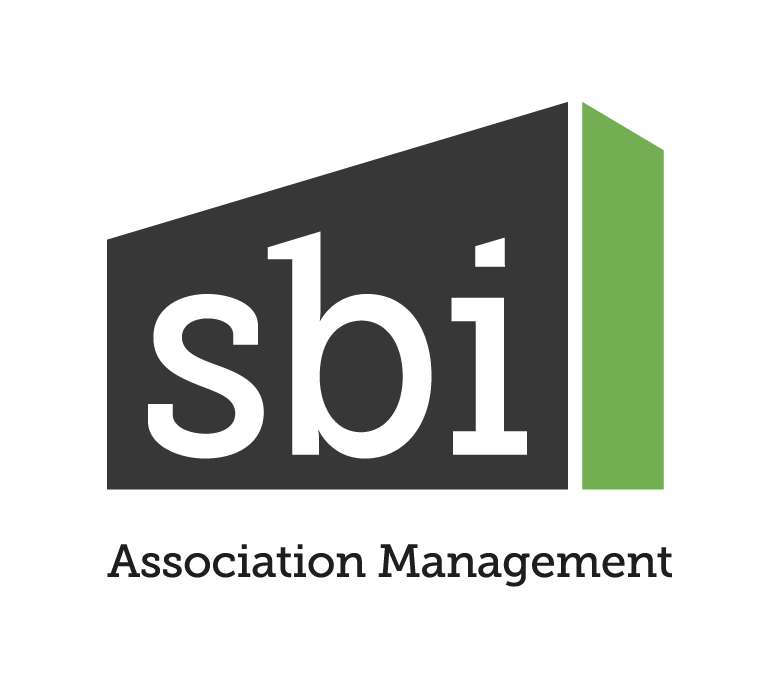
A thorough search for IOA’s new management partner has successfully resulted in the engagement of SBI Association Management of Seattle, WA, USA. In this role, SBI will be responsible for managing IOA’s daily operations, as well as aiding in our transition to a hybrid management model.
SBI is dedicated to operational excellence and relationship building with a client portfolio of 25+ associations. They take pride in an innovative approach to association management and growth, utilizing a combination of smart technology solutions and strong interpersonal connections to ensure their clients’ short- and long-term health. Learn more about SBI’s philosophy, clients, and staff.
It is a loud time in the world, and I am reminded of lines from a poem by Pablo Neruda, “Keeping Quiet.”
…If we were not so single-minded
About keeping our lives moving,
And for once could do nothing,
Perhaps a huge silence
Might interrupt this sadness
Of never understanding ourselves
And of threatening ourselves with death….
I recently returned from a trip to India, spreading the good news about our Ombuds Office with my wonderful colleague, Sophia Qiao. It was not a quiet trip. For those of you who have traveled or lived in India know, India can be a cacophony of traffic horns, streams of exotic language and lilting English. In the midst of this, there is the ubiquitous “namaste;” such a peaceful sound to my yogini ears. It was a full and wearying trip, but I was reminded how people everywhere respond to the peace and calm and safety we offer.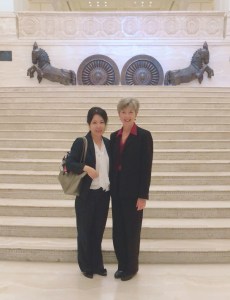
What comes to mind when you think of a mentor? Perhaps someone who is your role model, teacher, and positive influencer for your continued growth and development. My guess is that you may count many mentors over your career or for some of us, our careers. So how do mentors matter? I propose mentors matter in the following important roles:
First, an effective mentor serves as a guide. Ideally, she has the experience in your profession and will help you navigate your way. What kinds of obstacles might you encounter? What remedies and resources exist when those obstacles appear? She’s been there and done that and can encourage you along your path.
Secondly, your mentor is a confidant — someone with whom you can admit what you do not know. He’s the person who will listen to your fears and encourage you when you admit your lack of confidence. He helps you be your true self and you show him what’s behind your facade. He may encourage you to admit when you are wrong, or have made a mistake, and helps you hold your ego together when it’s cracked. He may employ humor and lightheartedness as a reminder to not take yourself too seriously.
Based on a directive from the IOA Board of Directors, the IOA Research Agenda Subcommittee, Shereen G. Bingham, Tyler S. Smith, Shannon L. Burton, and Danita Elkerson, have created a research agenda for the ombuds field.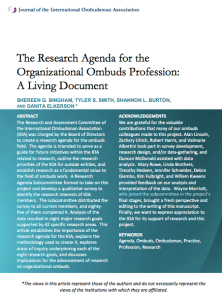
The agenda is intended to serve as a guide for future initiatives within the IOA related to research, outline the research priorities of the IOA for outside entities, and establish research as a fundamental value to the field of ombuds work.
This article published in the JIOA establishes the importance of the research agenda for the IOA, explains the methodology used to create it, explores areas of inquiry underpinning each of the eight research goals, and discusses implications for the advancement of research on organizational ombuds.
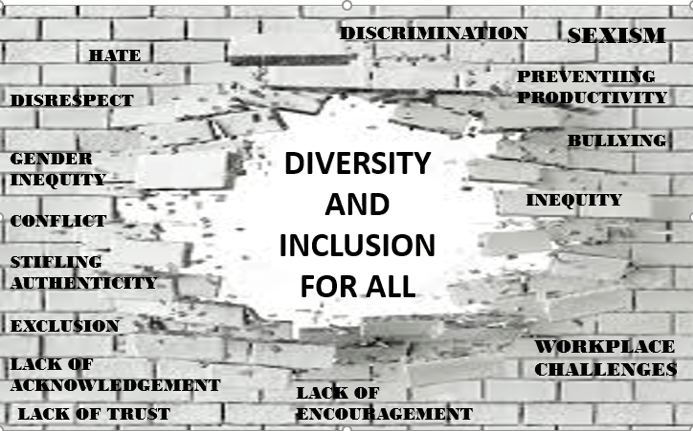 By Sana Ansari Manjeshwar
By Sana Ansari ManjeshwarOn the impact of including D&I principles in my Ombuds practice…
 I identify myself as an Asian, British, American female, raised in Nigeria, England and India, living in Texas and practicing spirituality inclusive of all religions. I used to think that my background represented the image of diversity and inclusion. I was wrong.
I identify myself as an Asian, British, American female, raised in Nigeria, England and India, living in Texas and practicing spirituality inclusive of all religions. I used to think that my background represented the image of diversity and inclusion. I was wrong.
Diversity and inclusion (D&I) is so much more than the representation of various genders and ethnicities. It means practicing a diverse and inclusive mindset where you are seeking different perspectives in the workplace and providing an environment where each person is valued for his/her/their distinctive skills, experiences, and viewpoints.
As a part of my service on the IOA Board of Directors, I am co-chair for the Standards of Practice Task Force. Like all members of this task force, I appreciate that the Standards form the core basis for our practice and that there are deep implications to identifying any potential issues with them. Yet my time on this task force has led me to ponder each of the major elements of the Standards.
Through this process, I have compared my own experiences across a long and varied career with those of other colleagues in light of our standard of “Independence.” One common assertion has been that, to comply with the Standards, adequate independence required that ombuds refrain from participating in the social fabric of their workplace. So, activities like meeting a colleague for lunch were out of the question. I have discovered through my own experience as well as observing the practical experience of others, however, that the implications of independence and neutrality become more intricate when practiced in the context of real-life human dynamics.
The expectation that an ombuds is to be viewed as a trusted, competent, respected, and independent member of the risk management community becomes far more complex when evaluated in light of how trust and respect actually form. One might assume that it is imperative to maintain a healthy state of “remoteness” and distance from those with whom the ombuds may need to engage to avoid any perception of non-neutrality. However, when one factors into the equation the key elements necessary to foster trust, effective communication, and an appropriate degree of influence (not over the outcome, but relevant to the need for action) that remoteness can work at cross purposes to building trust and rapport.
Working as an ombudsman creates a sense of isolation at times, especially when you are a sole practitioner within an organization. This is a dynamic that became my reality when I took on the role of ombudsman for a university in a rural community. Throughout my career as a conflict engagement professional, I’ve relied on strong networks to help me through phases of my professional development. Fortunately, I’ve been located in communities that had many experienced professionals with whom I could engage and work on a regular basis. Now that I am in a rural community, I must rely on networks that I maintain from a distance.
As a newcomer to the ombudsman profession, I am finding that access to a strong network of support is critical as I navigate the situations I encounter on a daily basis. However, as I become more focused in my work as a conflict practitioner, I have realized that not only is my geographic location a challenge, the wider community of professionals sharing this role is much smaller. Fortunately, I am finding that my colleagues serving as ombudsmen in other institutions are very open to communication and engaging on a level that provides the needed support to ensure that I remain on the right path.
It is with great appreciation that I felt the need to acknowledge the level of support these networks provide and also to encourage others to foster the networks available to them. To do this I wanted to share my story of network development as an ombudsman in a rural community and hope that it inspires the sharing of other ombudsmen’s experiences with the networks that support them. By illustrating the many opportunities to get engaged with those that can be supportive of our success in our role, this interchange will hopefully benefit others new to the field and those who simply feel they could gain value by expanding their networks.
Were you able to attend Popcorn Share: Discover New Resources to Enhance Your Ombuds Practice in Richmond? It was a highly-interactive session that resulted in the “crowdsharing” of this 9-page Popcorn Share Resource Guide. Within the guide you’ll find a variety of nuggets on coaching, training, navigating sticky situations, addressing systemic issues, and all kinds of professional development tips and tools.
We challenge all ombuds to review the list, discover something new, and comment below with something missed! Resources can be books, movies, assessments, tools, videos. TED talks, articles, ancient wisdom, psychology, brain science, metaphors, images, mantras….
Have some fun with it!
By Diana Mosonyi
A friend of mine came up with the term “ombuds tourist” when I was telling her about my attempt to visit as many ombuds offices in the US as I could. Between November 2017 and February 2018, I took up the quest to find an answer to a seemingly simple question: Why is working in an office where people bring their anger, frustration, despair, bitterness, and tears so attractive? I’d like to share my journey with readers of The Independent Voice, as I believe they might find it interesting and useful as they consider their work as ombuds or paths to the profession.

We all possess power in two key areas: questions and stories.
Questions are often asked to confirm an assumption, to challenge, or to convince. Imagine if we asked questions to truly learn about one another, particularly about those with whom we disagree or those very different from us? Questions, and the ways in which they are asked, have the potential to transform our interactions and inform how we approach, view, and engage people — particularly those with whom we deeply disagree. Through genuine curiosity we can learn to harness the power of questions to invite understanding and make connections between the asked and the asker. We can learn to:
Stories are important for relationships. We all have a story to tell. The power of story connects us as real people, valued for who we are and where we are in life. Unfortunately, we often feel like we know others — what their stories are, and why they do what they do. Or even worse, we do not care to know their stories. The challenge is to be willing to create the safety and the opportunity to elicit, then listen to, the story of another person. Allowing others to tell their stories is a gift we give to them.
Last week, I went to see my doctor. In the course of discussing my minor malady she briefly mentioned an experience she’d had as a patient herself. It was a casual, entirely appropriate remark. She didn’t “overshare” or project her experience onto me. Her anecdote took all of 10 seconds to relay, but it has stayed with me for days.
I like my doctor. She is knowledgeable, experienced, well-regarded. Her academic pedigree is top-notch and her online reviews uniformly superb. Her wry but warm bedside manner is exactly my speed. If you had asked me two weeks ago, “How’s your doctor?” I would have answered, “She’s perfect!”
But this week, I find her even perfect-er. In conveying that she knew what it felt like to be vulnerable and under another’s care, she created a deeper trust between us. That is the incredible power of evinced empathy—it closes gaps that you didn’t even know were there.
It was the title that caught my eye. How can you resolve a conflict with someone else without actually engaging that person? That’s what I was thinking when I signed up for this pre-conference workshop at the International Ombudsman Association Annual Conference in Minneapolis. I was also intrigued by the presenter, Nicole Gravagna, Ph.D., who has a background in neuroscience and the venture capital world. (She wrote Venture Capital for Dummies.)
So, what’s this all about and how can it help me in my work as the NC State faculty & staff ombuds? I will not provide all the details of the session, yet it is worth mentioning that we started out by shaping Playdoh© into parts of the brain with a focus on the ACC – Anterior Cingulate Cortex.
Can you identify these parts of the brain?
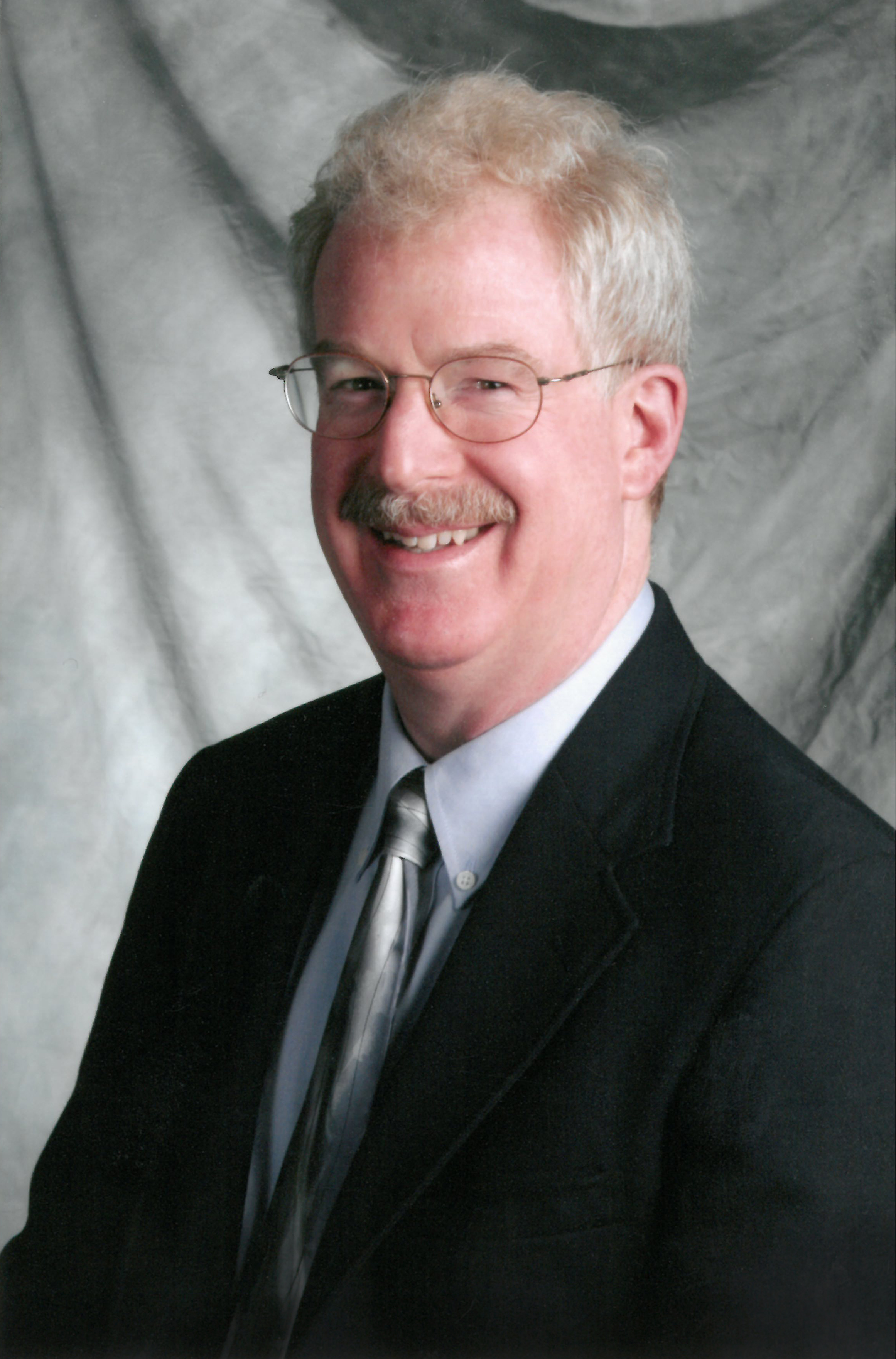
In higher education the start of the fall semester is a time to welcome new and returning students while also taking a fresh look at traditional perspectives. It is in that spirit that I offer a few thoughts on the future of organizational ombudsing.
First, I think we can all agree that our IOA version of the ombuds role is unique, valuable, and worth preserving. There’s nothing quite like it. I would also point out that at least in academia, the ombuds role was practiced effectively long before the IOA and the Standards of Practice (SOP) ever existed. I first came in contact with a university ombudsman as an undergraduate student at Northern Illinois University in the early 1970s. Although the SOP were still unwritten at the time, our campus ombudsman was indeed confidential, impartial, independent, and informal–pretty much as we use those terms today. Was that just a coincidence? I don’t think so because the role was being replicated on campuses across the country.
Those early academic ombuds pioneers fulfilled previously unmet campus needs for informal dispute resolution and fair process advocacy in a somewhat magical, behind the scenes manner. Although I’m not as familiar with the evolution of ombudsing in the corporate world and other organizational sectors, I think the role emerged in a similar way. The original organizational ombuds all came from a multitude of professional disciplines and work backgrounds. There were no sequential degree programs or step-wise career paths required. This was still the case when I became an ombuds in 1996 and remains true today. It is a large part of what makes the ombuds role special to the organizations that we serve.
Through the International Ombudsman Association (IOA), ombuds around the world learn their roles and connect with others in the field through the annual conference, training, and webinars, as well as through the various publications sponsored by IOA. These interactions allow us to network with individuals both in and outside our professional sector. However, for some, the large conferences might seem overwhelming and might not address the particular needs of a sector or issue. To meet these needs, sector-specific or region-specific meetings have emerged. These meetings allow for greater connection within sectors or regions and create a space for deeper conversation about specific issues. These groups, some of which are informally part of the larger IOA umbrella, can be defined as “communities of practice.” In 1991, theorists Jean Lave and Etienne Wenger coined the term “communities of practice” in their work examining legitimate peripheral participation. Legitimate peripheral participation describes the ways in which newcomers to a group become experienced members through low-risk activities whereby they become familiar with the organization, values and language of the group or community. Individuals form “communities of practice” when they engage in collective learning or in a shared human endeavor.
This past June, two such communities of practice met at Michigan State University. The first was the Summer Meeting of Academic Ombuds, a group that has met for the last 15 years to discuss ideas and support networking among those in the academic sector. A smaller group, the Michigan Caucus of Educational Ombuds, met for the third time to examine issues particular to their expanding group, as well as needs particular to those in the State of Michigan. MSU extended their hospitality as the kick-off to the celebration of the 50th year of their ombuds office, but more importantly, to contribute to these particular communities of practice.
